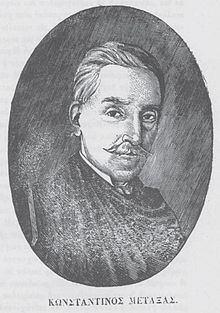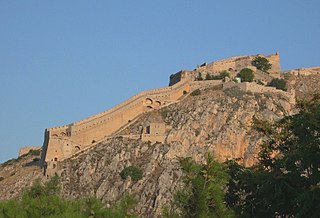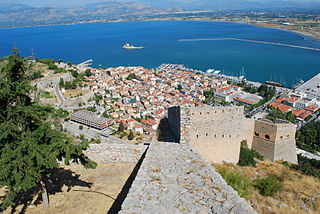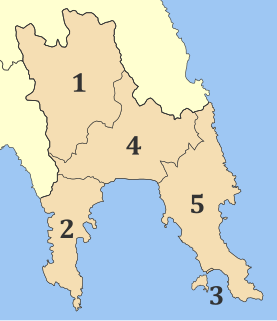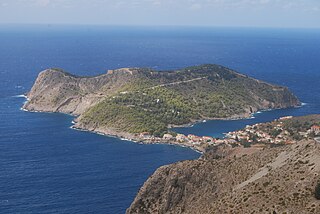
Cephalonia or Kefalonia, formerly also known as Kefallinia or Kephallenia (Κεφαλληνία), is the largest of the Ionian Islands in western Greece and the 6th largest island in Greece after Crete, Evoia, Lesbos, Rhodes, and Chios. It is also a separate regional unit of the Ionian Islands region, and the only municipality of the regional unit. It was also a former Latin Catholic diocese Kefalonia–Zakynthos (Cefalonia–Zante) and short-lived titular see as just Kefalonia.
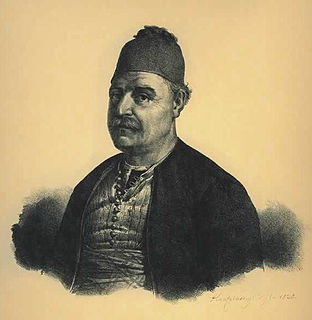
Andreas Vokos, nicknamed Miaoulis, was a Greek admiral and politician who commanded Greek naval forces during the Greek War of Independence (1821–1829).
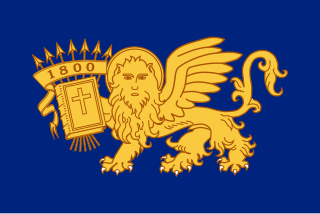
The Septinsular Republic was a republic that existed from 1800 to 1807 under nominal Russian and Ottoman sovereignty in the Ionian Islands.
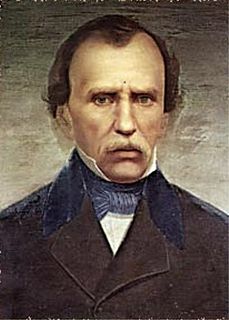
Andreas Metaxas was a Greek politician, fighter of the Greek War of Independence and diplomat from Cephalonia. He was prime minister of Greece from September 3, 1843 to February 16, 1844. The military leaders of the revolution gave him the ironic nickname of Conte Lalas due to his injury during the Battle of Lalas.

Metaxata is a village in the southern part of the island of Kefalonia, Greece. It has a population of 504 (2011). It is part of the municipal unit of Leivatho. It is situated in low hills, near the Ionian Sea coast. It is 2 km west of Kerameies, 2 km northeast of Svoronata, 2 km southwest of Peratata and 8 km southeast of Argostoli.
Manthos Economou was a Greek member of the Filiki Eteria, private secretary and advisor of Ali Pasha of Ioannina. He was executed by the Ottoman troops.

Kardhiq is a village in the former Cepo commune, Gjirokastër County, Albania. At the 2015 local government reform it became part of the municipality Gjirokastër. The village is inhabited by Muslim Albanians and an Orthodox Albanian population. Kardhiq Castle is located near the village.
The Albanian Regiment was a military unit of the First French Empire formed in 1807 in Corfu. It was commanded by Colonel Jean-Louis Toussaint Minot and served mainly as defence unit in the Septinsular Republic, then a de facto protectorate of the French Empire. It was disbanded in 1814.

The French rule in the Ionian Islands lasted from June 1797 to March 1799. Following the Fall of the Republic of Venice in May 1797, the Ionian Islands, a Venetian possession, were occupied by the French Republic. The French instituted a new, democratic regime and, following the Treaty of Campo Formio, annexed the islands to France, forming the three departments of Corcyre (Corfu), Ithaque (Ithaca) and Mer-Égée.
Konstantinos Th. Bakopoulos (1889-1950) was a Greek General in the Hellenic Army who took part in the Balkan Wars (1912-3), played a crucial conciliatory role in Greek military politics during the 1930s and distinguished himself in the fight against the Nazis during World War II. In 1943 he was imprisoned in German concentration camps until the end of the war in 1945.

Christoforos Perraivos was a Greek officer of the Greek War of Independence, member of the Filiki Eteria and author. In non-Greek sources his name is usually found as Per(r)evo(s).

Ioannis (Giannakis) Stratos (1793–1848) was an armatole and fighter of the Greek War of Independence. After the establishment of the Greek state, he became an officer of the Royal Phalanx.
Christos Palaskas was a Greek chieftain during the Greek War of Independence. He was killed on 25 May 1822 by Odysseas Androutsos’s men, during an internal conflict.

Konstantinos Asopios was a Greek scholar and academic teacher of the 19th century from Epirus.
Dimitrios Papatsonis was a fighter of the Greek War of Independence from Peloponnese. He was killed at the age of 27 in June 1825 during the battle of Trikorfa against the Egyptian forces of Ibrahim Pasha of Egypt.
Konstantinos Vlachopoulos was an armatolos, army leader of the Greek War of Independence and the first Greek leader of the Hellenic Royal Gendarmerie. He was also a member of the Filiki Eteria, a secret organization whose purpose was to overthrow the Ottoman rule of Greece and establish an independent Greek state.
Georgios Panou was a Greek ship-owner, member of the Filiki Eteria, fighter and politician of the Greek War of Independence from Spetses. He was distinguished for his participation in the naval operations of the Greek revolution.

Vasileios Goudas was a fighter of the Greek War of Independence and an officer of the Greek Army from Epirus.
Ioannis Trikoupis was a Greek politician of the Greek War of Independence.

Zakynthos is a Greek island in the Ionian Sea. It is the third largest of the Ionian Islands. Today, Zakynthos is a separate regional unit of the Ionian Islands region, and its only municipality. It covers an area of 405.55 km2 (156.6 sq mi) and its coastline is roughly 123 km (76 mi) in length. The name, like all similar names ending in -nthos, is pre-Mycenaean or Pelasgian in origin. In Greek mythology the island was said to be named after Zakynthos, the son of a legendary Arcadian chief Dardanus.
